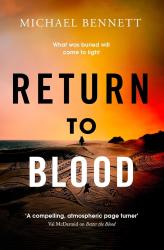Following on from the excellent first novel in this series, BETTER THE BLOOD, RETURN TO BLOOD is centred, once again, around Hana Westerman. Only now she has turned in her police badge, abandoning a career as a detective in the Auckland CIB, she's returned to her hometown of Tātā Bay to do some running repairs. On her own psyche which is battered and bruised, on her relationships with extended family which are fractious and strained, and to spend time with her beloved father, Eru. Not that everything about Tātā Bay is a happy memory, there's a monument to her high school classmate that she runs past daily, a Māori man in jail for that murder, despite Eru's misgivings about the conviction.
All of which ends up interwoven with a more current case when Westerman's daughter Addison finds a skeleton in the sand dunes. There's something about the backstory of this victim - a young Māori woman who had led a difficult life - that pulls Westerman and Addison into this investigation, despite neither of them having an official capacity, or even any direct connection with the victim.
Michael Bennett's style in these novels (the third, CARVED IN BLOOD due out mid 2025) is a combination of investigation of crime, interwoven with cultural and community implications. In all cases, Māori sensibility, community and interactions are forefront, often with clear illustration of how incompatible, cack-handed and unnecessary colonial methods are in communities looking for tradition, culture and resilience.
The cast of characters revolving around Westerman, her daughter and her friend, the elders in their Māori community, relatives and long-term friends, as well as her ex-husband, and his new family are an interesting bunch, as is the way this sort of blended and extended family works. There's tensions between everyone, and there is a lot of understanding and acceptance along the way. Westerman's position in the sandwich generation is also clear - her father potentially failing, her daughter still finding her way, there's something universal about that depiction of the generation caught as the carer between kids and parents, each with very different requirements. It's a particularly interesting portrayal in someone who so patently doesn't have their own act together in so many ways, creating an interesting triangle of need between the three age groups.
There's a well known adage about second novel syndrome, and there are a few glimpses of that in RETURN TO BLOOD. It's a bit inclined to wander at points, higher on emotion and the personal, than perhaps the crime and the criminal. Aspects of the case plot were a bit predictable, feeling a little padded to allow for the personal issues being addressed. This might be an issue for readers who are on the lookout for plot dense, action focused crime fiction. For those who are prepared to take their crime with their personal, to have a look at the development of a character who arrived on the scene with a massive thump in the first novel, RETURN TO BLOOD will have them awaiting the third book very eagerly indeed.
Return to Blood

After the perils of a case that landed much too close to home, Hana Westerman turned in her badge and abandoned her career as a detective in the Auckland CIB. Hoping that civilian life will offer her the opportunity to rest and recalibrate, she returns to her hometown of Tātā Bay, where she moves back in with her beloved father, Eru. Yet the memories of the past are everywhere, and as she goes for her daily run on the beach, Hana passes a local monument to Grace, a high school classmate who was murdered more than twenty years ago and hidden in the dunes overlooking the sea. A Māori man with a previous record was convicted of the crime, although Eru never believed he was guilty.
When her daughter finds another young woman’s skeleton in the sands, Hana soon finds herself awkwardly involved. Investigators suspect that this is Kiri Thomas, a young Māori woman who disappeared four years earlier, after battling years of drug addiction. Hana and her daughter Addison are increasingly captivated by the story behind this unsolved crime, but without the official police force behind her, Hana must risk compromising her own peace and relationships if justice is to be served.
Expanding the range of vivid characters who made Michael Bennett’s first book, Better the Blood, so appealing, and offering a shocking twist at the end, Return to Blood takes readers further into Māori culture and traditions as it engages us more deeply into the story of Hana Westerman
Add comment